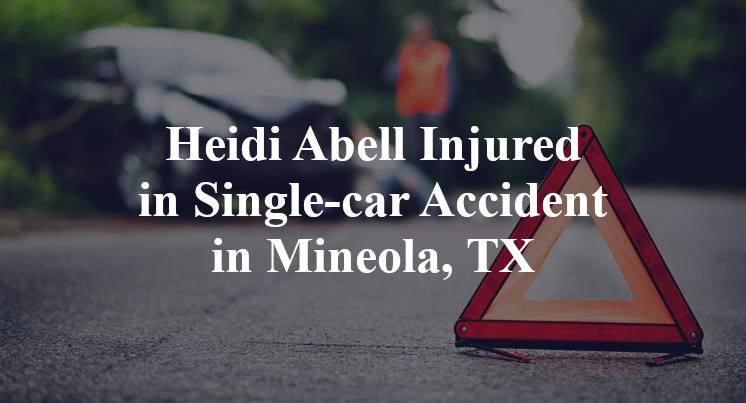Heidi Abell Injured in Single-car Accident in Mineola, TX
Wood County, TX — August 6, 2024, Heidi Abell was injured following a single-car accident just before 12:45 a.m. along Broad Street.
According to authorities, 52-year-old Heidi Abell was traveling in a southbound Hyundai Sonata on West Loop 564 at the S.H. 80 (Broad Street) intersection when the accident took place.

The cause of the accident remains unclear. Loop 564 reportedly ends in a T-shaped intersection with Broad Street. Officials indicate that, for as yet unknown reasons, the Hyundai failed to stop for the stop sign and, rather than turn either left or right onto Broad Street, continued straight, leaving the south side of the roadway and coming to a stop after crashing into a dirt embankment.
Abell reportedly suffered serious injuries over the course of the accident. Additional details pertaining to this incident are not available at this point in time.
Commentary
When a vehicle runs through a T-intersection and crashes into an embankment—particularly in the early morning hours—it’s easy to assume the driver missed the stop sign or misjudged the turn. But in my experience, especially with incidents like this one at the end of Loop 564 in Wood County, those assumptions often leave out critical factors that deserve closer examination. To understand what caused Heidi Abell’s crash and whether it could have been prevented, there are three important questions that should be asked.
First, did the authorities conduct a thorough investigation into the roadway conditions and signage? A T-intersection like the one at Broad Street requires clear, visible signage and adequate lighting to alert drivers of the road’s end. Investigators should determine whether the stop sign was well-lit, unobstructed, and accompanied by any other indicators like flashing lights or reflective markers. If the signage was difficult to see—due to darkness, foliage, or inadequate lighting—that’s not just an oversight, it’s a hazard. These environmental factors should be documented and, if necessary, reviewed independently.
Second, has anyone looked into whether a mechanical failure played a role in the crash? A vehicle that fails to stop or turn could be dealing with issues in its braking system, steering mechanism, or even tire traction—especially if road conditions were less than ideal. Less commonly considered, but equally relevant, is the possibility of an electronic malfunction in the vehicle’s driver-assist systems. These possibilities require a forensic inspection of the Hyundai Sonata, which is only possible if the vehicle is preserved in its post-crash condition.
Lastly, has the vehicle’s electronic data been collected? The Hyundai Sonata likely includes an event data recorder that captures critical pre-crash information such as vehicle speed, braking activity, throttle input, and steering angle. This data can help determine whether the driver attempted to stop or steer, and whether the vehicle responded appropriately. Supplementary sources like GPS data or nearby surveillance footage—if available—can also help clarify how and why the vehicle continued straight through the intersection. As always, time is critical when it comes to securing this kind of evidence.
When someone suffers serious injuries in a crash like this, we owe it to them to go beyond surface-level assumptions. Asking these questions is the least that can be done to ensure that those affected by this crash get the clarity and closure they deserve.

*We appreciate your feedback and welcome anyone to comment on our blog entries, however all visitor blog comments must be approved by the site moderator prior to showing live on the site. By submitting a blog comment you acknowledge that your post may appear live on the site for any visitors to see, pending moderator approval. The operators of this site are not responsible for the accuracy or content of the comments made by site visitors. By submitting a comment, blog post, or email to this site you acknowledge that you may receive a response with regard to your questions or concerns. If you contact Grossman Law Offices using this online form, your message will not create an attorney-client relationship and will not necessarily be treated as privileged or confidential! You should not send sensitive or confidential information via the Internet. Since the Internet is not necessarily a secure environment, it is not possible to ensure that your message sent via the Internet might be kept secure and confidential. When you fill out a contact or comment form, send us an email directly, initiate a chat session or call us, you acknowledge we may use your contact information to communicate with you in the future for marketing purposes, but such marketing will always be done in an ethical way.